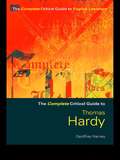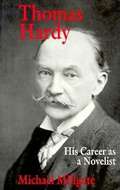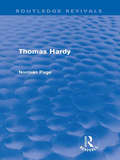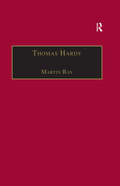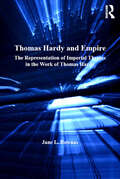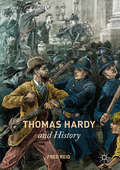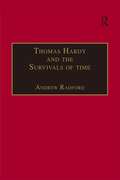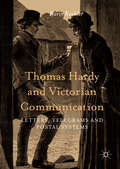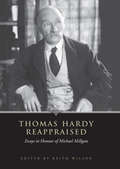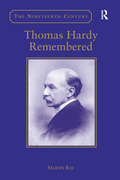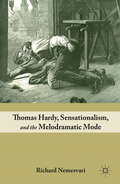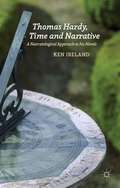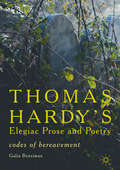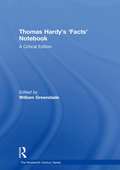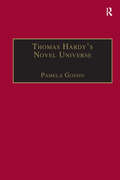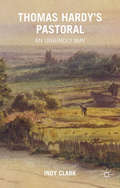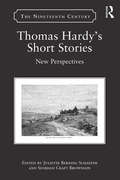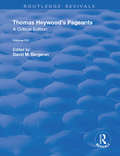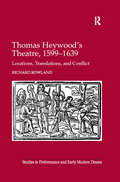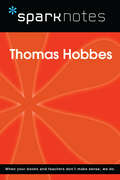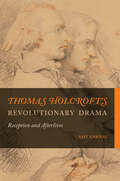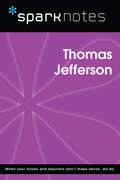- Table View
- List View
Thomas Hardy (Routledge Guides to Literature)
by Geoffrey HarveyThomas Hardy was the foremost novelist of his time, as well as an established poet. Author of Jude the Obscure and Far from the Madding Crowd, Hardy reflected in his works the dynamics of social, intellectual and aesthetic change in nineteenth-century England.This guide provides students with a lucid introduction to Hardy's life and works and the basis for a sound comprehension of his work, including: the major aspects of Hardy's life in the context of contemporary culture a detailed commentary on Hardy's most important work and a critical map of Hardy's complete writing an outline of the vast body of criticism that has built up around Hardy's work with examples of recent critical debate. Exposition and guide, this volume enables readers to form their own readings of one of the most important writers of the nineteenth century.
Thomas Hardy: His Career as a Novelist
by Michael MillgateFrom the preface: "This study of Thomas Hardy's career and achievement as a novelist is primarily critical in aim and emphasis: it proceeds largely in terms of independent discussions of the various novels. But my endeavour throughout has been to bring the results of scholarly research directly to bear upon the processes of analysis and evaluation-to consider Hardy's fiction in the context of available biographical and bibliographical knowledge and in relation to the social and intellectual milieux within which he lived and worked at various periods."
Thomas Hardy: The Novels (Routledge Revivals)
by Norman PageFirst published in 1977, this concise and insightful study of the life and works of Thomas Hardy provides a thorough examination of Hardy's literary output. Alongside a brief biography of Hardy's life, Professor Page's study also spotlights his major and minor novels, his short stories, his non-fiction prose and his verse.
Thomas Hardy: A Textual Study of the Short Stories (The Nineteenth Century Series)
by Martin RayThis is the definitive textual analysis of all of Hardy's collected short stories, tracing the development of each from manuscript, through newspaper serial versions, galley proofs and revises to collected editions in volume form. It is no surprise to discover that Hardy's capacity for inveterate revision is manifested in his tales as it was in his novels. Even those stories for which he professed little regard were meticulously and continuously revised, in some cases more than thirty years after their first publication. The alterations extend to the most minute details of plot, landscape, characterisation and style, as well as the restoration of bowdlerised passages which had been demanded by serial magazines. This study will play a major role in elevating the importance of this genre in Hardy's prolific output and will illuminate his textual practices - an area of considerable and growing interest to a large number of scholars and students.
Thomas Hardy and Desire
by Jane ThomasDrawing on a broad concept of desire, informed by poststructuralist theorists this book examines the range of Hardy's work. It demonstrates the sustained nature of his thinking about desire, its relationship to the social and symbolic network in which human subjectivity is constituted and art's potential to offer fulfilment to the desiring subject.
Thomas Hardy and Empire: The Representation of Imperial Themes in the Work of Thomas Hardy
by Jane L. BownasUnlike many of his contemporaries, Thomas Hardy is not generally recognized as an imperial writer, even though he wrote during a period of major expansion of the British Empire and in spite of the many allusions to the Roman Empire and Napoleonic Wars in his writing. Jane L. Bownas examines the context of these references, proposing that Hardy was a writer who not only posed a challenge to the whole of established society, but one whose writings bring into question the very notion of empire. Bownas argues that Hardy takes up ideas of the primitive and civilized that were central to Western thought in the nineteenth century, contesting this opposition and highlighting the effect outsiders have on so-called 'primitive' communities. In her discussion of the oppressions of imperialism, she analyzes the debate surrounding the use of gender as an articulated category, together with race and class, and shows how, in exposing the power structures operating within Britain, Hardy produces a critique of all forms of ideological oppression.
Thomas Hardy and History
by Fred ReidThis book addresses the questions 'What did Thomas Hardy think about history and how did this enter into his writings?' Scholars have sought answers in 'revolutionary', 'gender', 'postcolonial' and 'millennial' criticism, but these are found to be unsatisfactory. Fred Reid is a historian who seeks answers by setting Hardy more fully in the discourses of philosophical history and the domestic and international affairs of Britain. He shows how Hardy worked out, from the late 1850s, his own 'meliorist' philosophy of history and how it is inscribed in his fiction. Rooted in the idea of cyclical history as propounded by the Liberal Anglican historians, it was adapted after his loss of faith through reading the works of Auguste Comte, George Drysdale and John Stuart Mill and used to defend the right of individuals to break with the Victorian sexual code and make their own 'experiments in living'.
Thomas Hardy and the Survivals of Time (The Nineteenth Century Series)
by Andrew RadfordA systematic exploration of Thomas Hardy's imaginative assimilation of particular Victorian sciences, this study draws on and swells the widening current of scholarly attention now being paid to the cultural meanings compacted and released by the nascent 'sciences of man' in the nineteenth century. Andrew Radford here situates Hardy's fiction and poetry in a context of the new sciences of humankind that evolved during the Victorian age to accommodate an immense range of literal and figurative 'excavations' then taking place. Combining literary close readings with broad historical analyses, he explores Hardy's artistic response to geological, archaeological and anthropological findings. In particular, he analyzes Hardy's lifelong fascination with the doctrine of 'survivals,' a term coined by E.B. Tylor in Primitive Culture (1871) to denote customs, beliefs and practices persisting in isolation from their original cultural context. Radford reveals how Hardy's subtle reworking of Tylor's doctrine offers a valuable insight into the inter-penetration of science and literature during this period. An important aspect of Radford's research focuses on lesser known periodical literature that grew out of a British amateur antiquarian tradition of the nineteenth century. His readings of Hardy's literary notebooks disclose the degree to which Hardy's own considerable scientific knowledge was shaped by the middlebrow periodical press. Thus Thomas Hardy and the Survivals of Time raises questions not only about the reception of scientific ideas but also the creation of nonspecialist forms of scientific discourse. This book represents a genuinely new perspective for Hardy studies.
Thomas Hardy and Victorian Communication
by Karin KoehlerThis book explores the relationship between Thomas Hardy's works and Victorian media and technologies of communication - especially the penny post and the telegraph. Through its close analysis of letters, telegrams, and hand-delivered notes in Hardy's novels, short stories, and poems, it ties together a wide range of subjects: technological and infrastructural developments; material culture; individual subjectivity and the construction of identity; the relationship between private experience and social conventions; and the new narrative possibilities suggested by modern modes of communication.
Thomas Hardy in Context
by Phillip MallettThis collection covers the range of Thomas Hardy's works and their social and intellectual contexts, providing a comprehensive introduction to Hardy's life and times. Featuring short, lively contributions from forty-four international scholars, the volume explores the processes by which Hardy the man became Hardy the published writer; the changing critical responses to his work; his response to the social and political challenges of his time; his engagement with contemporary intellectual debate; and his legacy in the twentieth century and after. Emphasising the subtle and ongoing interaction between Hardy's life, his creative achievement and the unique historical moment, the collection also examines Hardy's relationship to such issues as class, education, folklore, archaeology and anthropology, evolution, marriage and masculinity, empire and the arts. A valuable contextual reference for scholars of Victorian and modernist literature, the collection will also prove accessible for the general reader of Hardy.
Thomas Hardy Reappraised
by Keith WilsonAs a writer who achieved major eminence in both fiction and poetry and whose engagement with these genres encompassed the period of transition from Victorianism to Modernism, Thomas Hardy (1840-1928) enjoys a unique position in English Literary History. Michael Millgate, University Professor of English Emeritus at the University of Toronto is widely recognized as the world's foremost Thomas Hardy scholar. His contributions to the study of Hardy over more than three decades include his recently 'revisited' biography, the seven volume edition of Hardy's collected letters, and the influential critical study Thomas Hardy: His Career as a Novelist.In Thomas Hardy Reappraised, editor Keith Wilson pays tribute to Millgate's many contributions to Hardy studies by bringing together new work by fifteen of the world's most eminent Hardy scholars. These essays address questions of biblical and literary allusiveness, cultural, historical, and philosophical context, narrative and poetic theory and practice, as well as Hardy's place in the modern world and his influence on younger writers. Together, the contributors offer one of the most significant reappraisals of Hardy's work to have appeared since Michael Millgate helped to transform Hardy studies. They offer graphic testimony to Hardy's enduring popularity and importance.Contributors:Pamela DalzielMary RimmerDennis TaylorBarbara HardyU.C. KnoepflmacherMarjorie GarsonRuth Bernard YeazellSimon GatrellJ. Hillis MillerGeorge LevineJeremy V. SteeleWilliam W. MorganSamuel HynesNorman PageW. J. Keith
Thomas Hardy Remembered (The Nineteenth Century Series)
by Martin RayThomas Hardy Remembered assembles some 150 annotated interviews and recollections of Hardy, most of which are being reprinted for the first time. They range from close personal reflections by old friends such as Sir George Douglas, J.M. Barrie, and Edmund Gosse, to fleeting glimpses by strangers who saw Hardy at a London party or at his club. Martin Ray has selected items having the greatest literary or biographical significance, and annotated them with meticulous accuracy and a keen eye for the telling detail. As a result, the volume will be an invaluable resource to scholars who are interested not only in what concerned Hardy personally and professionally, but also in how he was perceived by others. Having these items collected in one volume reveals Hardy's contemporaneous opinions about his own writings and also makes it possible to trace the marked recurrence, over time, of certain preoccupations: ancient families, Hardy's hostility to reviewers, architecture, Roman relics, Wessex folklore and dialect, animal welfare, Napoleon, and hangings. With regard to his literary career, a portrait emerges of Hardy as the scrupulous professional, properly aware of his commercial rights, while at the same time appearing, to some who met him, unconscious of his own genius.
Thomas Hardy, Sensationalism, and the Melodramatic Mode
by Richard NemesvariThe first full-length study of sensationalist and melodramatic elements in Hardy's novels uses six of his texts to demonstrate the ways in which Hardy uses the melodramatic mode to advance his critique of established Victorian cultural beliefs through the employment of non-realistic plot devices and sensational 'excess. '
Thomas Hardy, Time and Narrative
by Ken IrelandHow is Hardy's development of thematics and characters matched by that of narrative techniques and his handling of time? This book uses narratological methods to stress the interdependence of content and expression in a key transitional writer between the Victorian and Modernist eras.
Thomas Hardy’s Elegiac Prose and Poetry
by Galia BenzimanThis book examines the transition from traditional to modern elegy through a close study of Thomas Hardy’s oeuvre and its commitment to mourning and remembrance. Hardy is usually read as an avowed elegist who writes against the collective forgetfulness typical of the late-Victorian era. But Hardy, as argued here, is dialectically implicated in the very cultural and psychological amnesia that he resists, as her book demonstrates by expanding the corpus of study beyond the spousal elegies (the “Poems of 1912-1913”) to include a wide variety of poems, novels and short stories that deal with bereavement and mourning. Locating the modern aspect of Hardy’s elegiac writing in this ambivalence and in the subversion of memory as unreliable, the book explores the textual moments at which Hardy challenges binary dichotomies such as forgetting vs. remembering, narcissism vs. unselfish commitment, grief vs. betrayal, the work of mourning vs. melancholia, presence vs. absence. The book's analysis allows us to relate Hardy’s elegiac poetics, and particularly his description of the mourner as a writer, to shifting late-Victorian conceptualizations of death, memory, art, science and gender relations.
Thomas Hardy’s ‘Facts’ Notebook: A Critical Edition (The Nineteenth Century Series)
by William GreensladeWithin weeks of Thomas Hardy’s return to his native Dorchester in June 1883, he began to compile his ’Facts’ notebook, which he kept up throughout the years when he was writing some of his major work - The Mayor of Casterbridge, The Woodlanders, Tess of the d’Urbervilles and Jude the Obscure. From his intensive study of the Dorset County Chronicle for 1826-1830, he noted and summarised into 'Facts' (with the help of his first wife, Emma) hundreds of reports, many of them suggestive 'satires of circumstance', for possible use in his fiction and poems. Along with extensive reading in memoirs and local histories, this immersion in the files of the old newspaper involved him in a wider experience - the recovery and recognition of the unstable culture of the local past in the post-Napoleonic war years before his birth in 1840, and before the impact of the modernising of the Victorian era. 'Facts' is thus a unique document amongst Hardy's private writings and is here for the first time edited, the text transcribed in 'typographical facsimile' form, together with substantial annotation of the entries and critical and textual introductions.
Thomas Hardy's Jude the Obscure (Modern Critical Interpretations)
by Harold BloomEssays on Jude the Obscure by Michael Millgate, Janet Burstein, Ian Gregor, Terry Eagleton, Norman Page, Kathleen Blake, Ramón Saldivar, and Philip M. Weinstein.
Thomas Hardy's Novel Universe: Astronomy, Cosmology, and Gender in the Post-Darwinian World (The Nineteenth Century Series)
by Pamela GossinIn this, the first book-length study of astronomy in Hardy's writing, historian of science and literary scholar Pamela Gossin brings the analytical tools of both disciplines to bear as she offers unexpected and sophisticated readings of seven novels that enrich Darwinian and feminist perspectives on his work, extend formalist evaluations of his achievement as a writer, and provide fresh interpretations of enigmatic passages and scenes. In an elegantly crafted introduction, Gossin draws together the shared critical values and methods of literary studies and the history of science to articulate a hybrid model of scholarly interpretation and analysis that promotes cross-disciplinary compassion and understanding within the current contention of the science/culture wars. She then situates Hardy's own deeply interdisciplinary knowledge of astronomy and cosmology within both literary and scientific traditions, from the ancient world through the Victorian era. Gossin offers insightful new assessments of A Pair of Blue Eyes, Far from the Madding Crowd, The Return of the Native, Two on a Tower, The Woodlanders, Tess of the D'Urbervilles, and Jude the Obscure, arguing that Hardy's personal synthesis of ancient and modern astronomy with mythopoetic and scientific cosmologies enabled him to write as a literary cosmologist for the post-Darwinian world. The profound new myths that comprise Hardy's novel universe can be read as a sustained set of literary thought-experiments by which he critiques the possibilities, limitations, and dangers of living out the storylines that such imaginative cosmologies project for his time - and ours.
Thomas Hardy's Pastoral: An Unkindly May
by Indy ClarkThis book reads Hardy's poetry of the rural as deeply rooted in the historical tradition of the pastoral mode even as it complicates and extends it. It shows that in addition to reinstating the original tensions of classical pastoral, Hardy dramatizes a heightened awareness of complex communities and the relations of class, labour, and gender.
Thomas Hardy's Short Stories: New Perspectives (The Nineteenth Century Series)
by Juliette Berning Schaefer Siobhan Craft BrownsonThomas Hardy penned nearly fifty short stories, but in spite of this impressive number, his contributions to the genre have been relatively understudied. Bringing together an international group of scholars, this is the first edited collection devoted solely to Hardy's works of short fiction. The contributors take up topics related to their publication in periodicals, gender and community relationships, and narrative techniques. Taken together, the essays show that Hardy's short stories are important, not only for what they tell us about Hardy as a writer who straddles the divide between the traditionalist and the modernist, but also for how they reflect and inform the period in which he wrote.
Thomas Heywood's Pageants (Routledge Revivals)
by Thomas HeywoodPublished in 1986: This book is about the shows which were put on during the inauguration of new Mayors of London. Such pageants were processions through the city of London with tableaux vivants; some of the shows also included dramatic entertainment on the Thames.
Thomas Heywood's Theatre, 1599–1639: Locations, Translations, and Conflict (Studies in Performance and Early Modern Drama)
by Richard RowlandIn this major reassessment of his subject, Richard Rowland restores Thomas Heywood-playwright, miscellanist and translator-to his rightful place in early modern theatre history. Rowland contextualizes and historicizes this important contemporary of Shakespeare, locating him on the geographic and cultural map of London through the business Heywood conducts in his writing. Arguing that Heywood's theatrical output deserves the same attention and study that has been directed towards Shakespeare, Jonson, and more recently Middleton, this book looks at three periods of Heywood's creativity: the end of the Elizabethan era and the beginning of the Jacobean, the mid 1620s, and the mid to late 1630s. By locating the works of those years precisely in the political and cultural conflicts to which they respond, Rowland initiates a major reassessment of the remarkable achievements of this playwright. Rowland also pays attention to Heywood in performance, seeing this writer as a jobbing playwright working in an industry that depended on making writing work. Finally, the author explores how Heywood participated in the civic life of London in his writings beyond the playhouse. Here Rowland examines pamphlets, translations, and the sequence of lord mayor's pageants that Heywood produced as the political crisis deepened. Offering close readings of Heywood that establish the range, quality and theatrical significance of the writing, Thomas Heywood's Theatre, 1599-1639 fits a fascinating piece into the emerging picture of the 'complete' early modern English theatre.
Thomas Hobbes (SparkNotes Philosophy Guide)
by SparkNotesThomas Hobbes (SparkNotes Philosophy Guide) Making the reading experience fun! SparkNotes Philosophy Guides are one-stop guides to the great works of philosophy–masterpieces that stand at the foundations of Western thought. Inside each Philosophy Guide you&’ll find insightful overviews of great philosophical works of the Western world.
Thomas Holcroft’s Revolutionary Drama: Reception and Afterlives (Transits: Literature, Thought & Culture, 1650-1850)
by Amy GarnaiA key figure in British literary circles following the French Revolution, novelist and playwright Thomas Holcroft promoted ideas of reform and equality informed by the philosophy of his close friend William Godwin. Arrested for treason in 1794 and released without trial, Holcroft was notorious in his own time, but today appears mainly as a supporting character in studies of 1790s literary activism. Thomas Holcroft’s Revolutionary Drama authoritatively reintroduces and reestablishes this central figure of the revolutionary decade by examining his life, plays, memoirs, and personal correspondence. In engaging with theatrical censorship, apostacy, and the response of audiences and critics to radical drama, this thoughtful study also demonstrates how theater functions in times of political repression. Despite his struggles, Holcroft also had major successes: this book examines his surprisingly robust afterlife, as his plays, especially The Road to Ruin, were repeatedly revived worldwide in the nineteenth century.
Thomas Jefferson (SparkNotes Biography Guide)
by SparkNotesThomas Jefferson (SparkNotes Biography Guide) Making the reading experience fun! SparkNotes Biography Guides examine the lives of historical luminaries, from Alexander the Great to Virginia Woolf. Each biography guide includes:An examination of the historical context in which the person lived A summary of the person&’s life and achievements A glossary of important terms, people, and events An in-depth look at the key epochs in the person&’s career Study questions and essay topics A review test Suggestions for further reading Whether you&’re a student of history or just a student cramming for a history exam, SparkNotes Biography guides are a reliable, thorough, and readable resource.
